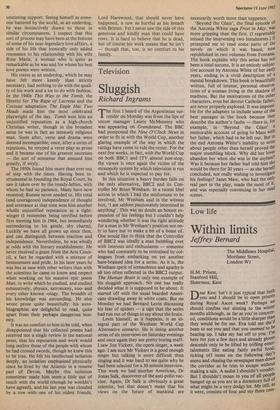Television
Sluggish
Richard Ingrams The first I heard of the Argentinian sur- render on Monday was from the lips of soccer manager Laurie McMenemy who was appearing on Grandstand. The BBC had postponed the Nine O'Clock News in order to fit in with the World Cup, another glaring example of the way in which the ratings have come to rule the roster. For the next few weeks, in fact, with the World Cup on both BBC1 and ITV almost non-stop, the viewer is once again the victim of the monopoly system by which television is run and which he is expected to pay for.
In this situation a heavy burden falls on the only alternative, BBC2 and its Con- troller Mr Brian Wenham. In a recent libel action in which I had the misfortune to be involved, Mr Wenham said in the witness box, 'I am seldom passionately interested in anything'. This was no doubt an honest ex- pression of his feelings but I couldn't help wondering whether it was the right attitude for a man in Mr Wenham's position not on- ly to have but to make a bit of a boast of. One would like to think that the Controller of BBC2 was ideally a man bubbling over with interests and enthusiasms — someone who had constantly to be restrained by col- leagues from embarking on yet another hare-brained idea for a series. As it is, the Wenham spirit of somnolence and apathy is all too often reflected in the BBC2 output. The Human Brain is only one example of his sluggish approach. No one has really decided what it is supposed to be about. It started off with the usual bearded Ameri- cans drawling away in white coats. But on Monday we had Bernard Levin discussing his fear of spiders — a sign that the series had run out of things to say about the brain.
Levin himself, as it happens, is an in- tegral part of the Wenham World Cup Alternative scenario. He is doing another series of six interviews on Saturday evenings and once again they are pretty boring stuff. I saw Jon Vickers, the opera singer, a week ago. I am sure Mr Vickers is a good enough singer but talking is more difficult than singing and it was hard to see quite why he had been selected for a 30-minute interview. This week we had another American, Dr Jonas Salk, discoverer of the anti-polio vac- cine. Again, Dr Salk is obviously a great scientist, but that doesn't mean that his views on the future of mankind are necessarily worth more than tuppence.
Beyond the Glass', the final episode of the 'Antonia White saga Frost in May, was more gripping than the first. (I regrettably missed the intervening two instalments.) It prompted me to read some parts of the novels on which it was based, now republished in two volumes from Fontana. The book explains why this series has not been a total success. It is an entirely subjec- tive account by Antonia White of her early years, ending in a vivid description of a mental breakdown. This book is beautifully written, full of intense, personal observa- tions of a woman living in the shadow of madness. But the motivations of the other characters, even her devout Catholic father, are never properly explored. It was impossi- ble for the adapters to include some of the best passages in the book because they describe the author's faults — there is, for example, in 'Beyond the Glass' memorable account of going to Mass With her father, which had to be left out. But in the end Antonia White's inability to write about people other than herself proved the major stumbling block. Why did her lover abandon her when she was in the asylum? Was it because her father had told him she would be there for 20 years — as she herself concluded, not really wishing to investigate his feelings? Janet Maw, who had the only real part in the play, made the most of it, and was especially convincing in her mad scenes.




































 Previous page
Previous page